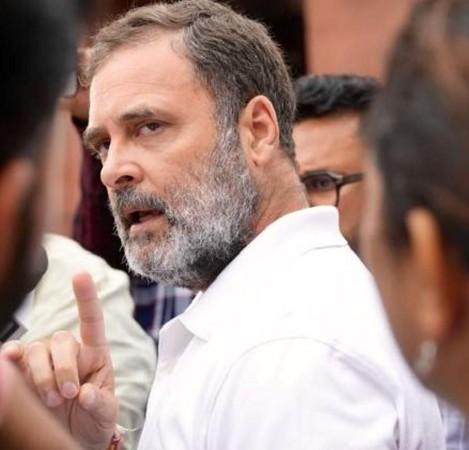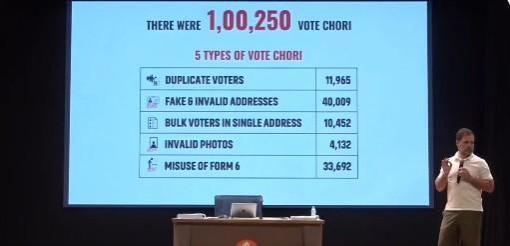
In a startling revelation, Rahul Gandhi, the Leader of the Opposition in the Lok Sabha, has accused the Election Commission of India of colluding with the Bharatiya Janata Party (BJP) to manipulate voter rolls during the 2024 Lok Sabha elections. The allegations focus on the Mahadevapura Assembly segment in Karnataka's Bangalore Central constituency, where Gandhi claims over 1,00,250 votes were fraudulently manipulated. This claim is supported by data collected over six months by a team of 30 to 40 individuals, suggesting that such practices are widespread across the country.
Gandhi highlighted several methods allegedly used to perpetrate this fraud. He pointed to the presence of duplicate voters, with 11,965 entries found to be duplicated across multiple booths and even states. Names like Gurkirat Singh and Aditya Shrivastava appeared multiple times, with Shrivastava's name appearing in different states, including Karnataka, Maharashtra, and Uttar Pradesh. Additionally, he mentioned fake or invalid addresses, where 40,009 voter entries listed addresses that did not exist or were clearly fake, such as house number "0" or symbols like "-" or "#".
The Congress party received 6,26,208 votes in Bangalore Central, while the BJP secured 6,58,915 votes, resulting in a margin of 32,707 votes. However, a closer examination of the Mahadevapura Assembly segment revealed a significant discrepancy. In this segment, the BJP polled 2,29,632 votes, while the Congress managed only 1,15,586 votes, creating a staggering gap of 1,14,046 votes. Gandhi claimed that at least 1,00,250 votes were stolen in this single Assembly segment alone, and similar activities were being conducted across the country.
Gandhi also addressed the issue of mass voters registered at a single address. He cited examples such as House No. 35, which had 80 registered voters in a single-room dwelling, and a brewery that had 68 voters registered, raising serious questions about the legitimacy of these entries. "When our people went there to check and cross-verify, we found that in much of such addresses, where dozens of people are allegedly living, were a single-story apartment. When we went there, we were threatened and, in some places, we were told that no such individual lived there," he said.

Furthermore, Gandhi highlighted the presence of 4,132 invalid entries that either had missing photos or photos so small or unclear that identification was impossible. He also pointed out the misuse of Form 6 by 33,629 voters. Gandhi emphasized that this is why the poll panel refuses to provide soft copies of voter rolls or allow a proper audit of data. He also alleged the destruction of CCTV footage to eliminate evidence of wrongdoing. "This isn't just a local issue. What happened in Mahadevapura is happening across India," Gandhi stated.
The allegations have sparked a significant political controversy, with the Congress party demanding a thorough investigation into the matter. The BJP, on the other hand, has dismissed the allegations as baseless and politically motivated. The Election Commission has yet to respond to these serious accusations. Historically, allegations of electoral fraud have been a recurring issue in Indian politics. One notable instance was during the 1971 general elections, where the then Prime Minister Indira Gandhi was accused of electoral malpractices, leading to the landmark case of Raj Narain vs. Indira Nehru Gandhi.

















